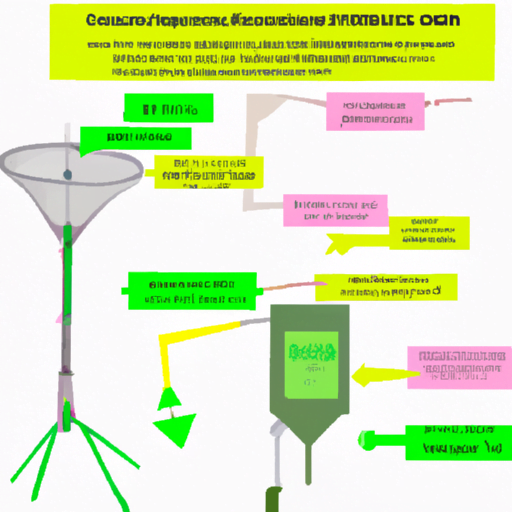Do you ever wonder what it would be like to live completely off the grid? To be self-sufficient and not rely on the power grid or other public utilities? Well, in this article, we’re going to explore the fascinating world of off-grid living and how you can achieve remote self-sufficiency. Exciting, isn’t it?
Imagine a life where you generate your own electricity, collect rainwater for drinking and irrigation, grow your own food, and live in harmony with nature. That’s what off-grid living is all about! It’s about being self-reliant and independent, making use of renewable resources like solar and wind power, and reducing your impact on the environment. In the upcoming paragraphs, we’ll dive deeper into the details and explore all the different ways you can achieve remote self-sufficiency. So, get ready to expand your knowledge and discover the ultimate guide to off-grid living!
Achieving Remote Self-Sufficiency: The Ultimate Guide to Off-Grid Living
Have you ever imagined a life where you are not dependent on the grid for your basic needs? A life where you can produce your own energy, grow your own food, and live in harmony with nature. This is what off-grid living is all about. In this ultimate guide, we will explore the concept of off-grid living, its advantages and challenges, and provide you with practical tips on how to design your off-grid living space, achieve water and power independence, become self-sufficient in food production, and much more. So buckle up and get ready to embark on your remote self-sufficiency journey today!
Understanding Off-Grid Living
Off-grid living refers to a lifestyle where individuals or communities are self-reliant and not connected to the traditional electrical grid, water supply, or sewage systems. It involves living in a way that minimizes dependence on outside resources and promotes sustainability and self-sufficiency. By embracing off-grid living, you can have a smaller environmental footprint, reduce your reliance on fossil fuels, and gain a sense of freedom and independence.
Advantages of Off-Grid Living
Environmental Sustainability: One of the main advantages of off-grid living is its positive impact on the environment. By producing your own energy from renewable sources, such as solar, wind, or hydro power, you reduce your carbon footprint and contribute to the preservation of our planet.
Cost Savings: While the initial investment in off-grid systems can be significant, the long-term cost savings are substantial. By producing your own energy and growing your own food, you can drastically reduce or eliminate your monthly bills, allowing you to save money in the long run.
Self-Sufficiency: Off-grid living promotes self-sufficiency by empowering individuals to meet their own basic needs. By growing your own food, collecting and purifying your own water, and producing your own energy, you become less dependent on external resources and more self-reliant.
Enhanced Resilience: Being off-grid provides you with resilience in the face of natural disasters or grid failures. While others may struggle without power or essential services, you can continue living comfortably and without disruptions.
Challenges of Off-Grid Living
Initial Investment: Setting up an off-grid living space requires a significant upfront investment. The cost of solar panels, wind turbines, batteries, and other necessary equipment can seem daunting at first. However, it’s important to consider the long-term savings and benefits that come with being off-grid.
Learning Curves: Living off-grid often comes with a steep learning curve. You will need to learn how to operate and maintain different systems, such as solar power systems or composting toilets. It may take time and effort to become proficient in these sustainable living practices.
Limited Resources: Living off-grid in remote areas may mean limited access to resources such as healthcare, education, or transportation. It’s essential to plan ahead and find creative solutions to overcome these challenges.
Designing Your Off-Grid Living Space
Choosing a Location
The first step in designing your off-grid living space is to choose an appropriate location. Consider factors such as access to sunlight, wind patterns, water sources, and proximity to amenities. Look for land that allows for sustainable practices, such as organic gardening or renewable energy installation.
Selecting the Right Type of Shelter
When it comes to shelter, there are various options to choose from. Tiny homes, yurts, earthships, or cob houses are popular choices for off-grid living. These alternative housing options are eco-friendly, cost-effective, and can be designed to be energy-efficient.
Off-Grid Energy Solutions
Generating your own energy is a key component of off-grid living. Solar power systems, wind turbines, and hydro power systems are the three primary options for off-grid energy production. Solar power is the most common and accessible option, while wind and hydro power require specific conditions and locations. Consult with experts to determine the best energy solution for your off-grid living space.
Water Independence for Off-Grid Living
Collecting and Storing Rainwater
Rainwater collection is crucial for off-grid living, as it provides a reliable source of water. Install gutters and downspouts on your roof to direct rainwater into storage tanks or barrels. Proper filtration and purification systems will ensure the collected rainwater is safe for drinking and other uses.
Alternative Water Sources
In addition to rainwater, exploring alternative water sources is essential for off-grid living. This may include digging wells, accessing nearby rivers or lakes, or utilizing natural springs. Each water source will require specific filtration and purification methods to ensure its safety and usability.
Water Purification Methods
Having access to clean and safe drinking water is vital for off-grid living. There are several water purification methods available, such as boiling, filtration, and chemical treatment. Research and invest in the appropriate water purification systems to maintain a healthy water supply.

Powering Your Off-Grid Lifestyle
Solar Power Systems
Solar power systems are a popular choice for off-grid energy production due to their accessibility and efficiency. Install solar panels on your property and connect them to batteries for energy storage. This stored energy can then be used to power your home’s electrical needs, from lighting to appliances.
Wind Power Systems
If you live in an area with consistent wind patterns, a wind power system can be a great addition to your off-grid energy setup. Install a wind turbine to harness the power of the wind and convert it into electricity. Like solar power systems, connect the turbine to batteries for energy storage.
Hydro Power Systems
If you have access to a flowing water source, such as a river or stream, a hydro power system can be an excellent option for off-grid energy production. Install a turbine in the flowing water to generate electricity. Ensure proper permits and safety measures are in place before implementing a hydro power system.
Achieving Food Self-Sufficiency
Organic Gardening Techniques
Growing your own food is a fundamental aspect of off-grid living. Practice organic gardening techniques, such as companion planting, crop rotation, and natural pest control, to ensure a healthy and sustainable food production system. Start small and gradually expand your garden as you gain experience.
Vertical Farming
In limited space or urban environments, vertical farming can be a viable option for food self-sufficiency. Utilize vertical structures, such as trellises or vertical gardens, to grow a wide variety of crops in a small footprint. Vertical farming maximizes space and allows for efficient food production.
Raising Livestock and Poultry
For a comprehensive food production system, consider raising livestock and poultry. Chickens, rabbits, or goats can provide a sustainable source of meat, eggs, milk, and wool. However, ensure you have sufficient space, knowledge, and resources to care for and manage the animals properly.
Maintaining Communication Off the Grid
Satellite Communication Systems
When living off-grid in remote areas, it’s crucial to have a reliable communication system. Satellite communication systems, such as satellite phones or satellite internet, can provide connectivity in areas without traditional telecommunication infrastructure. These systems use satellites to establish a connection, allowing for communication even in remote locations.
Radio Communication Alternatives
In addition to satellite communication, radio communication alternatives can serve as a valuable tool for off-grid living. CB radios, HAM radios, or walkie-talkies provide a means of communication within a limited range. Join local radio clubs or organizations to connect with other off-grid enthusiasts and establish a reliable communication network.
Internet Solutions for Remote Areas
Access to the internet can be challenging in remote off-grid areas. However, various solutions can help you stay connected. Satellite internet, mobile hotspot devices, or wireless internet service providers (WISPs) offer connectivity options in areas with limited or no access to traditional internet providers.

Off-Grid Waste Management
Composting Toilets
Off-grid living requires alternative waste management solutions. Composting toilets are an eco-friendly and sustainable option that converts human waste into nutrient-rich compost. They eliminate the need for water-based sewage systems and provide a valuable resource for organic gardening.
Greywater Systems
Greywater refers to wastewater from sources such as sinks, showers, and laundry. Implementing a greywater system allows you to treat and reuse this water for irrigation or other non-potable uses. Install filters and storage tanks to capture and divert greywater for maximum efficiency.
Recycling and Reusing Waste
Off-grid living promotes sustainability and resource consciousness. Implement recycling practices to minimize waste and utilize materials to their fullest potential. Reuse or repurpose items whenever possible and compost organic waste to create nutrient-rich soil for gardening.
Navigating Off-Grid Healthcare
First Aid and Emergency Medical Skills
Living off-grid requires self-reliance when it comes to healthcare. Acquire basic first aid skills and knowledge to handle minor injuries and medical emergencies. Stock up on essential medical supplies, including bandages, disinfectants, and over-the-counter medications, to address common health issues.
Natural Remedies and Herbal Medicine
In remote off-grid areas, access to conventional medicine may be limited. Explore natural remedies and herbal medicine as alternative healthcare options. Research local plants and their medicinal properties, and learn to prepare and use herbal remedies for common ailments.
Telemedicine Options
Telemedicine provides remote healthcare access through technology. Utilize telemedicine services to connect with healthcare professionals and seek advice or treatment remotely. Consult with telemedicine providers to understand the available services and the necessary equipment or technology requirements.
Managing Off-Grid Finances
Budgeting and Financial Planning
Off-grid living requires careful budgeting and financial planning. Analyze your income and expenses to develop a realistic budget that aligns with your off-grid lifestyle. Consider long-term savings, emergency funds, and maintenance costs for your off-grid systems.
Income Generation Ideas
Generating income while living off-grid can be challenging but not impossible. Explore income generation ideas that align with your passions and skills. This may include selling homegrown produce, crafts, or services within your local community or online.
Bartering and Trading
Bartering and trading with the local off-grid community can also provide a means of acquiring goods and services without relying on traditional currency. Develop relationships with like-minded individuals and establish a system for exchanging items or skills that benefit both parties.
Educating Off-Grid
Homeschooling Resources and Curriculum
If you have children, homeschooling is a popular choice for off-grid families. Research homeschooling resources and curricula to provide your children with a quality education. Utilize online learning platforms, libraries, or local community resources to supplement their education.
Practical Skills for Self-Sufficiency
Off-grid living offers an opportunity to acquire practical skills that promote self-sufficiency. Teach your children essential life skills such as gardening, cooking, carpentry, or sustainable energy practices. These skills will empower them to live a self-sufficient and sustainable lifestyle.
Online Learning Options
While living off-grid, access to formal education may be limited. However, online learning platforms provide a wealth of educational resources. Explore online courses, tutorials, or e-books to expand your knowledge and skills in various subjects.
Keeping Secure in Remote Areas
Safety Measures for Off-Grid Living
Living in remote areas can present unique safety challenges. Install security measures such as motion sensor lights, sturdy locks, or a security system to deter potential threats. Develop emergency plans and practice safety drills to ensure the well-being of yourself and your loved ones.
Self-Defense Skills and Strategies
Consider learning self-defense skills and strategies to enhance your personal security. This may include martial arts training, firearm education, or non-lethal self-defense techniques. Remember, the goal is always to prioritize personal safety and de-escalate situations whenever possible.
Community Building and Collaboration
Building a strong off-grid community can contribute to security and resilience. Connect with like-minded individuals or join existing off-grid communities to share resources, knowledge, and support. Collaborate on security measures, emergency preparedness, or mutual assistance to ensure the well-being of the community as a whole.
Mental and Emotional Well-being in Isolation
Coping Strategies for Psychological Challenges
Living in remote off-grid areas can sometimes lead to feelings of isolation or loneliness. Develop coping strategies to address these psychological challenges, such as maintaining a routine, engaging in hobbies or activities that bring joy, or practicing mindfulness and meditation. Stay connected with loved ones through regular communication channels.
Activities for Mental Stimulation
Keep your mind stimulated and engaged with various activities. Read books, engage in creative projects, learn new skills, or pursue hobbies that interest you. Keeping your mind active and engaged will help maintain mental well-being and combat boredom.
Building Strong Social Connections
Developing and maintaining social connections is vital for mental well-being, even in remote off-grid areas. Attend local gatherings, connect with neighboring off-grid communities, or participate in online forums to meet like-minded individuals and build meaningful relationships.
Embracing Sustainability in Off-Grid Living
Reducing Waste and Consumption
Off-grid living inherently promotes sustainability by reducing waste and consumption. Embrace a minimalist mindset and make conscious choices to reduce, reuse, and recycle. Consider the environmental impact of your actions and adopt sustainable practices in every aspect of your off-grid lifestyle.
Renewable Energy Advocacy
As an off-grid individual, you are already an advocate for renewable energy. Share your experiences and knowledge with others to promote the benefits of renewable energy and inspire more people to embrace sustainable living practices. Educate your community about the importance of transitioning to renewable energy sources.
Permaculture and Regenerative Practices
Permaculture and regenerative practices are holistic approaches to land and resource management. Implement permaculture principles such as water harvesting, companion planting, and soil regeneration to create self-sustaining ecosystems that support long-term food production and environmental sustainability.
Conclusion
Congratulations! You’ve reached the end of our ultimate guide to off-grid living. By understanding the concept of off-grid living, recognizing its advantages and challenges, and implementing the practical tips provided, you are well on your way to achieving remote self-sufficiency. Embrace the freedom and sense of independence that off-grid living offers and embark on your self-sufficient journey today. Remember, by living off the grid, you become a steward of the Earth, leading the way towards a sustainable and harmonious future.




